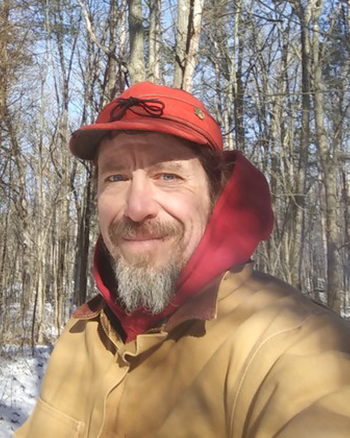MSU Forestry online master’s program producing productive graduates
Joshua Harrison found his calling in forestry, MSU provided the skills for a career

When James Rivard, forest management instructor and coordinator of the Hybrid Online MS Degree in Forestry, designed the program with a committee of faculty and leaders from the Michigan State University Department of Forestry, the department envisioned it as an “on ramp” into a forestry career.
The program, launched in summer 2022 with six students, has already seen graduates join the workforce in forestry careers around the country, including roles in the United States Forest Service as well as public and private forestry roles in Michigan and around the country.
The Hybrid Online MS in Forestry is a professional degree tailored to learners with a bachelor’s degree in a non-forestry field who would like to pursue a career in forestry. Most courses are delivered online to provide maximum flexibility for those with existing personal and professional commitments.

“The course is catered to everyone. We had a couple of students who were already forest technicians and wanted to earn the degree to advance in their careers. We’ve had others who have come in with natural resources degrees in fields other than forestry, we’ve had a few people come into the program from education and teaching as well as folks with business, accounting, game design and computer technology backgrounds,” Rivard said. “We are getting a number from around the country, from Pennsylvania, New Jersey, Washington, West Virginia, and one this year from Canada. It’s great to see all the backgrounds come together and really be invested in forestry.”
In 2022, Michigan's forest products industries provided direct employment to more than 40,000 people, leading to $16.2 billion in economic output. The total economic impact of the forest products industries in Michigan is more than $26 billion and supports over 88,000 jobs. Many of the graduates of the Hybrid Online MS in Forestry will pursue forestry careers in Michigan and contribute to the dynamic forestry sector but the program also has a national reach, with students from around the country pursuing careers in their home states.

“MSU’s Hybrid Online MS is helping to meet the tremendous demand for forestry professionals in industry, state, and federal government,” said Richard Kobe, professor and Chairperson of the Department of Forestry. “It is a win-win-win situation; a win for individuals who want to switch to an outdoors career, for employers seeking forestry professionals, and for the sustainability of forests in Michigan and beyond.”
Joshua Harrison finished his bachelor’s degrees in psychology and Spanish in 2008. The Ann Arbor, Mich., native struggled to carve out his career during a time of global economic uncertainty. “I was kind of out of luck in terms of starting my career when I graduated college – it was right in the middle of the housing crisis, and I ended up doing a lot of traveling, doing volunteer work and gigs in South America and eventually got into more farming and landscaping,” he said.
He found his passion in working with trees. He began working for a tree service in the Detroit area, liked the work and wanted to learn more about trees, forests and forest management. “That was when I really felt like I found a field that I loved and truly connected with and began looking for avenues to either become a certified arborist or perhaps a forester.”
Harrison’s search led him to the Hybrid Online MS Degree in Forestry, and he was a member of the program’s second cohort.
“It worked out perfectly. I owned a house and had a job making good income with the tree service, so the program allowed me to balance my work/study life,” said Harrison, who finished his degree in May and currently works for Hydrolake, Inc. out of Cadillac, Mich.
Students choose the pace at which they plan to complete their coursework. Each cohort begins with an in-person, nine-day course designed to immerse the students into the fundamentals and basics of fieldwork and tree identification. Students come in with various levels of forestry knowledge, but Rivard said each is motivated and quick to learn and engage.
"The incoming students attend an intense, in-person field course that doubles are a big bonding experience,” Rivard said. “Everyone gets to know each other well and you can see them become engaged right away with the material. The graduate students are very motivated and quickly become immersed with the work.”
The degree program culminates with a capstone project that consists of a survey of forested land. Students present their findings to faculty, peers and representatives from Michigan’s forestry industry and the Michigan Department of Natural Resources.
MSU faculty and staff that contributed to the program design and implementation include:
- Rich Kobe, Chair MSU Department of Forestry
- David Rothstein, Professor, Forest Ecology / Biogeochemistry
- Aki Koyoma, Assistant Professor, Soil Microbiology and Biogeochemistry
- Katie James, Research Administrator – Graduate Academic Program Coordinator
- Emily Silver, Director of Graduate Studies, and Associate Professor, Human Dimensions of Forestry
- Jessica Meisel, Associate Professor, Ecology, Evolution & Behavior Program
The program is designed to provide a fast-track and intensive graduate-level degree that does not lack for depth and application, according to Harrison. Rivard worked with MSU Forestry faculty, forestry industry professionals and stakeholders to create a curriculum that addresses relevant natural resources needs.
“Jim is just a great teacher. He's pretty stern and old school. He's not going to just give you an easy ride. You can really tell he's passionate about the field and cares a lot about the foresters MSU is putting out there,” Harrison said. “He wants people coming out of his program to be the best, and he pushed us hard, and we learned a lot.”
The third cohort of students just started the fall semester, completing the summer introductory course and starting their first online courses coupled with local field work in forests across the country. Students will apply basic principles and online coursework to forests and woodland areas near them, learning to identify species and issues relevant to their home states.
“Jim has done amazing job with the students. I think that when we first proposed this program, there was a natural skepticism about the ability to teach a master’s level forestry course mostly online,” said David Rothstein, professor in forestry ecology and Director of Graduate Studies in the Department of Forestry.
“It’s a testament to the students who are coming into the program and the faculty who are pushing them online and in the field that our students are getting through this program with meaningful degrees and making an impact in forests around the country. Jim was made for this program.”



 Print
Print Email
Email




